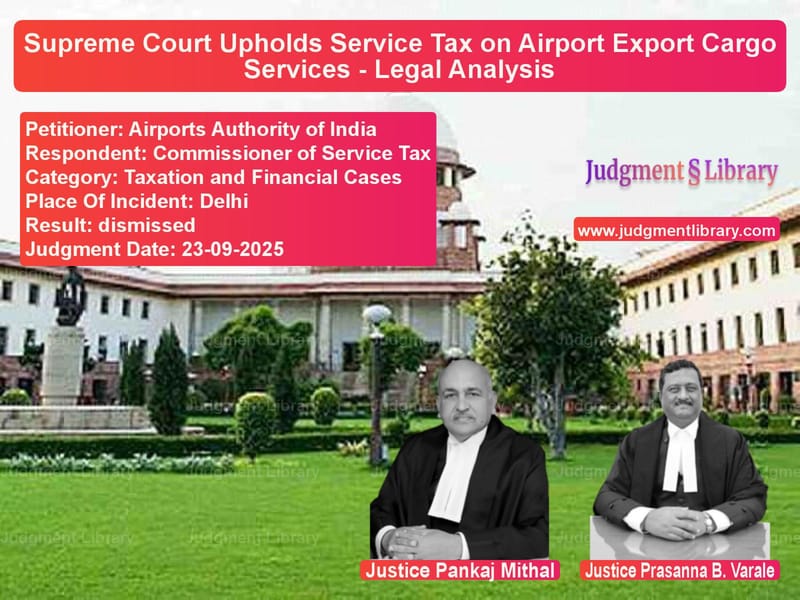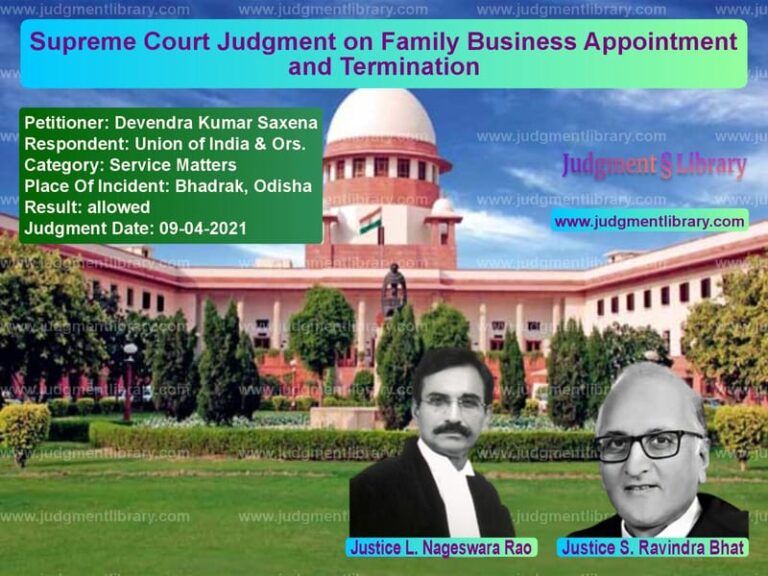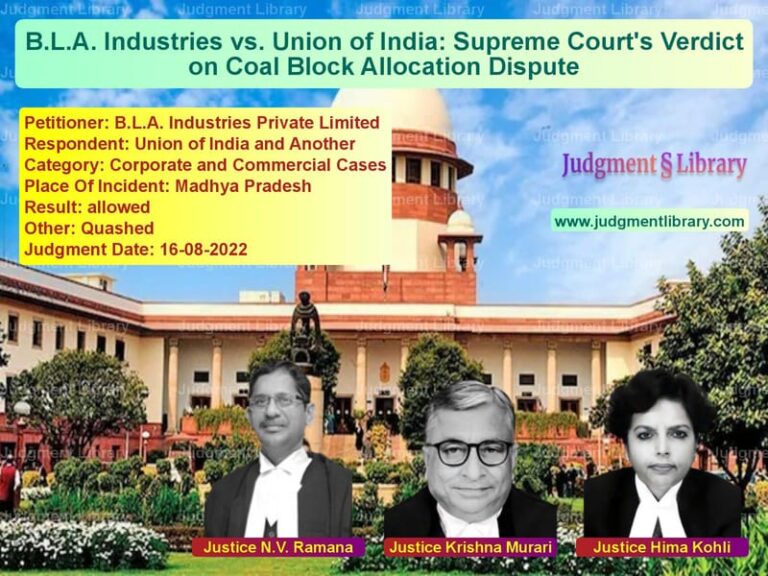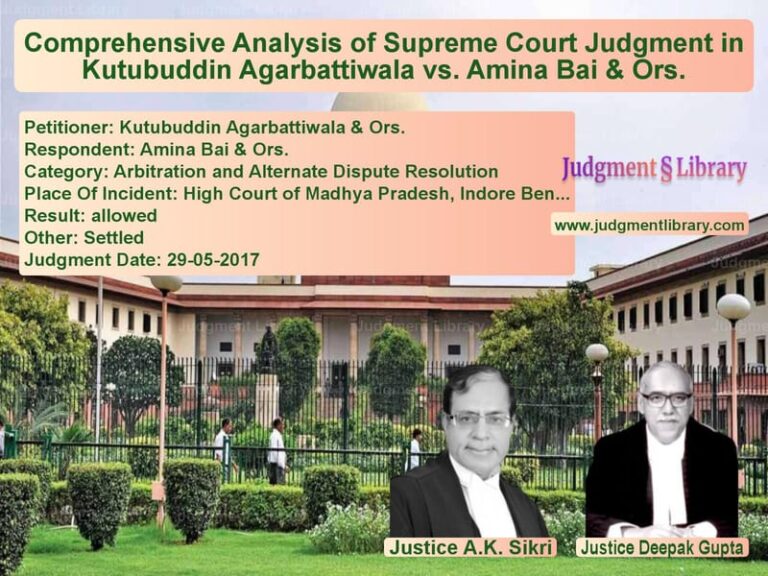Supreme Court Upholds Service Tax on Airport Export Cargo Services – Legal Analysis
In a significant judgment that clarifies the scope of service tax on airport operations, the Supreme Court of India recently delivered a verdict that has important implications for the aviation industry and service tax jurisprudence. The case involved the Airports Authority of India challenging the imposition of service tax on its export cargo handling services, raising fundamental questions about the interpretation of tax statutes and the distinction between different categories of taxable services.
The legal dispute centered around whether services related to handling export cargo at airports should be exempt from service tax. The Airports Authority of India, a Government of India organization under the Ministry of Civil Aviation, had been managing various airports across the country and was registered with the Service Tax Department for payment of service tax. The controversy arose when the tax authorities confirmed service tax liability on the Authority’s export cargo handling activities.
The Nature of Services in Question
The services under scrutiny involved comprehensive cargo handling activities at airports. As described in the judgment, “The appellant in discharge of its duties, handle cargo on airports including export cargo which involves a number of activities like unloading, carting, X-ray, export packing, etc. These services are rendered from the time the cargo is accepted for shipment till it is placed on the aircraft.” These services formed an essential part of the export process, ensuring that goods moved efficiently from land transportation to air cargo.
The Commissioner (Adjudication), Service Tax, Delhi had initially confirmed the service tax liability for the period from October 1, 2003 to March 31, 2007. The tax was imposed under the category of “Storage and Warehousing Service” up to September 9, 2004, and under “Airport Services” from September 10, 2004 onwards. When the Airports Authority challenged this decision before the Customs, Excise & Service Tax Appellate Tribunal (CESTAT), the tribunal confirmed the service tax liability under the “Airport Services” category from September 10, 2004.
The Core Legal Argument
The appellant’s primary legal contention was presented by Mr. Y. K. Kapur, learned counsel for the Airports Authority. He argued that “the services on which the service tax has been confirmed are all relating to handling of export cargo and as such, stand excluded under Sub-section (23) of Section 65 of the Finance Act,1994.” This formed the crux of the appellant’s case – that export cargo handling enjoyed a specific exemption under the statute.
Mr. Kapur specifically “emphasized upon the Proviso to Sub-section (23) of Section 65 of the Act to submit that the handling of export cargo is excluded from the ‘cargo handling service’ and as such, is not covered under the taxable service as defined under Sub-section (105) of Section 65 of the Act.” This argument sought to leverage the specific exclusion of export cargo from the definition of cargo handling services to claim complete exemption from service tax.
The Supreme Court’s Legal Analysis
The Supreme Court bench comprising Justices Pankaj Mithal and Prasanna B. Varale conducted a meticulous analysis of the relevant statutory provisions. The Court began by clarifying the fundamental structure of the service tax law, noting that “Section 65 of the Act is not the charging section but a provision defining various terms in connection with the service tax.” This distinction proved crucial in understanding the legislative scheme.
The Court examined Sub-section (23) of Section 65, which defines “cargo handling service,” and observed that it “inter alia provides that services of loading, unloading, packing and unpacking of cargo including certain other services would amount to ‘cargo handling services’ but would not include handling of export cargo.” While acknowledging this exclusion, the Court emphasized that this definitional provision “does not speak about charging of service tax upon cargo handling service.”
The Charging Section and Taxable Services
The Court then turned to Section 66 of the Finance Act, which serves as the charging section for service tax. The Court noted that “Section 66 of the Act envisages levying of ‘Service Tax’ at the rate of twelve per cent of the value of ‘taxable services’, as referred to in the sub-clauses therein including sub-clause (zzm) of Sub-section (105) of Section 65 of the Act.” This marked a critical turning point in the legal analysis.
The definition of “taxable services” under Sub-section (105) of Section 65 proved to be the decisive factor. The Court explained that “‘Taxable services’ are defined under Sub-section (105) of Section 65 of the Act to mean any services provided or to be provided to various persons, including those falling under sub-clause (zzm), i.e. service provided to any person by Airports Authority or by any other person, in any airport or a civil enclave.”
The Court emphasized the comprehensive nature of this definition, stating that “The aforesaid sub-clause (zzm) is wide enough to cover any kind of service provided to any person by the Airport Authorities in any airport or a civil enclave. Therefore, whatever services are provided by the Airports Authority in any airport falls under ‘taxable service’ in view of sub-clause (zzm).”
The Crucial Distinction
The Court made a vital distinction that ultimately determined the outcome of the case. While acknowledging that “The definition of ‘cargo handling service’ includes various kinds of services rendered at the airport, but it specifically excludes ‘handling of export cargo’,” the Court clarified that “Thus, ‘handling of export cargo’ stands excluded from the ‘cargo handling service’ but that by itself would not be sufficient to exclude it from the definition of taxable service under Sub-section (105) of Section 65 of the Act.”
This reasoning highlighted the difference between being excluded from one category of service and being exempt from taxation altogether. The Court elaborated that “The services rendered by the Airports Authority to any person in any airport are in the nature of taxable service and the exclusion of ‘export cargo’ from the definition of ‘cargo handling service’ makes no difference as to the chargeability of service tax on the services so rendered falls under the taxable service.”
Legislative Intent and Temporal Application
The Court also addressed the temporal aspect of the taxation, noting that “sub-clause (zzm) was introduced w.e.f. 10.09.2004. Accordingly, any kind of services whether in respect of export cargo provided by the Airports Authority to any person after inclusion of sub-clause (zzm) would be taxable service.” This clarified that the taxability commenced from the date the specific provision was introduced in the statute.
The Court reinforced its interpretation by referencing the legislative intent behind the charging provision, stating that “This is also the intent of the charging Section 66 of the Act, which provides that there shall be tax levied on the services referred to in sub-clauses as mentioned therein, including sub-clause (zzm). In short, any kind of services which are covered under any of the sub-clauses of Section 66, including (zzm) are chargeable to tax and are taxable service.”
Final Ruling and Implications
In its concluding remarks, the Court dismissed the appellant’s reliance on various circulars, stating that “The various circulars relied upon by Mr. Y. K. Kapur, learned counsel for the appellant, are of no avail, as they are merely circulars and cannot override the express statutory provisions.”
The Court ultimately held that “Accordingly, we are of the opinion that the CESTAT or the Authorities below have not erred in taxing the services rendered by the appellant in relation to export cargo as taxable service under sub-clause (zzm) of Sub-section (105) of Section 65 of the Act with effect from 10.09.2004.”
This judgment serves as an important precedent in service tax jurisprudence, emphasizing that specific exclusions in definitional clauses do not necessarily create exemptions from taxation when a broader charging provision applies. The decision clarifies that services provided by airport authorities fall within the ambit of taxable services under the Finance Act, regardless of whether they involve export cargo, provided they meet the general criteria of services rendered at airports. The ruling reinforces the principle that statutory provisions must be interpreted in their entirety, with charging sections taking precedence over definitional exclusions in specific categories.
Petitioner Name: Airports Authority of India.Respondent Name: Commissioner of Service Tax.Judgment By: Justice Pankaj Mithal, Justice Prasanna B. Varale.Place Of Incident: Delhi.Judgment Date: 23-09-2025.Result: dismissed.
Don’t miss out on the full details! Download the complete judgment in PDF format below and gain valuable insights instantly!
Download Judgment: airports-authority-o-vs-commissioner-of-serv-supreme-court-of-india-judgment-dated-23-09-2025.pdf
Directly Download Judgment: Directly download this Judgment
See all petitions in Customs and Excise
See all petitions in Tax Evasion Cases
See all petitions in GST Law
See all petitions in Judgment by Pankaj Mithal
See all petitions in Judgment by Prasanna Bhalachandra Varale
See all petitions in dismissed
See all petitions in supreme court of India judgments September 2025
See all petitions in 2025 judgments
See all posts in Taxation and Financial Cases Category
See all allowed petitions in Taxation and Financial Cases Category
See all Dismissed petitions in Taxation and Financial Cases Category
See all partially allowed petitions in Taxation and Financial Cases Category







